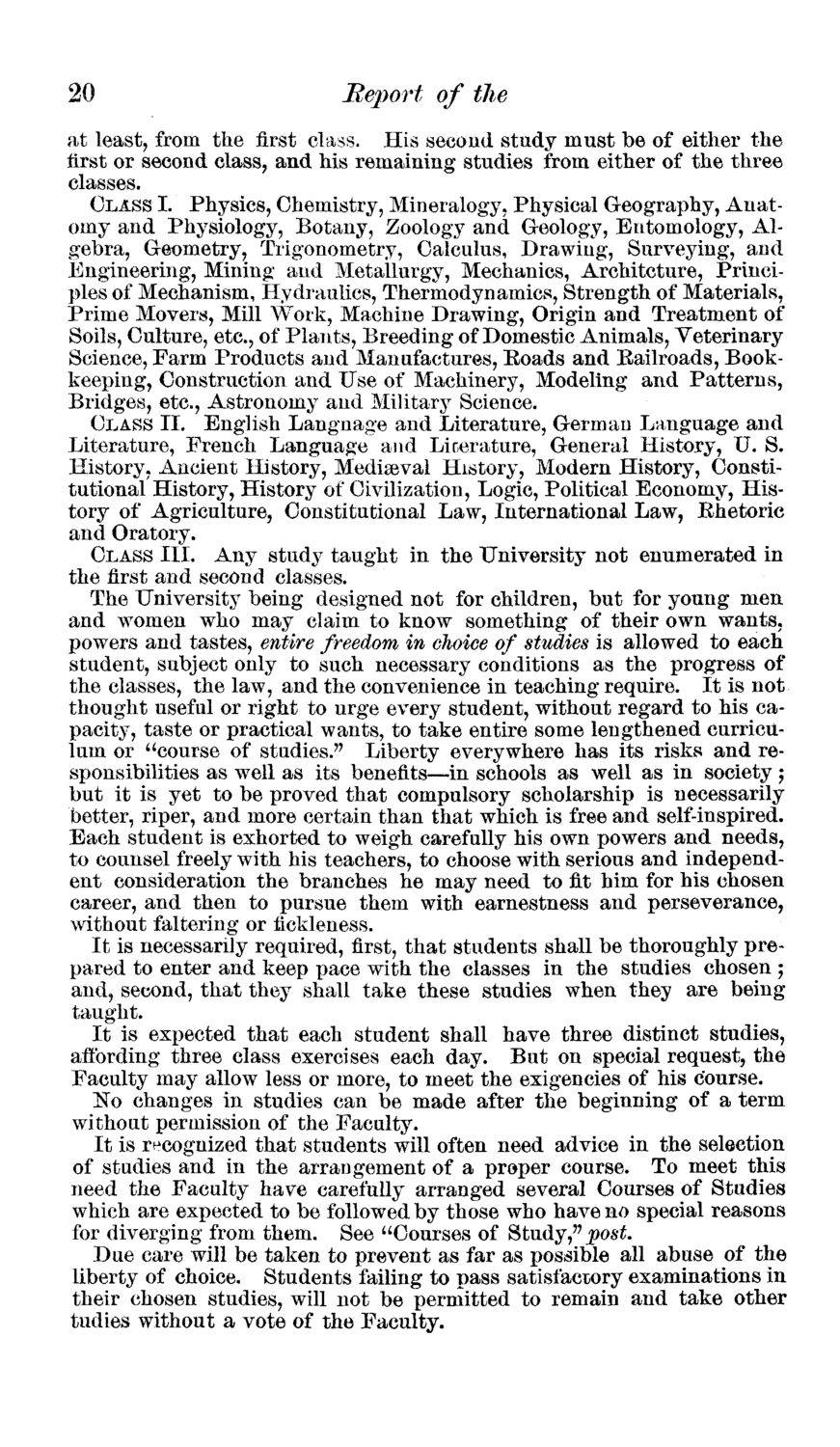| |
| |
Caption: Board of Trustees Minutes - 1874
This is a reduced-resolution page image for fast online browsing.

EXTRACTED TEXT FROM PAGE:
20 Report of the at least, from the first class. His second study must be of either the first or second class, and his remaining studies from either of the three classes. CLASS I. Physics, Chemistry, Mineralogy, Physical Geography, Anatomy and Physiology, Botany, Zoology and Geology, Entomology, Algebra, Geometry, Trigonometry, Calculus, Drawing, Surveying, and Engineering, Mining and Metallurgy, Mechanics, Architcture, Principles of Mechanism, Hydraulics, Thermodynamics, Strength of Materials, Prime Movers, Mill Work, Machine Drawing, Origin and Treatment of Soils, Culture, etc., of Plants, Breeding of Domestic Animals, Veterinary Science, Farm Products and Manufactures, Roads and Railroads, Bookkeeping, Construction and Use of Machinery, Modeling and Patterns, Bridges, etc., Astronomy and Military Science. CLASS II. English Language and Literature, Germau Language and Literature, French Language and Literature, General History, U. S. History, Ancient History, Mediaeval History, Modern History, Constitutional History, History of Civilization, Logic, Political Economy, History of Agriculture, Constitutional Law, International Law, Rhetoric and Oratory. CLASS III. Any study taught in the University not enumerated in the first and second classes. The University being designed not for children, but for young men and women who may claim to know something of their own wants, powers and tastes, entire freedom in choice of studies is allowed to each student, subject only to such necessary conditions as the progress of the classes, the law, and the convenience in teaching require. It is not thought useful or right to urge every student, without regard to his capacity, taste or practical wants, to take entire some lengthened curriculum or "course of studies." Liberty everywhere has its risks and responsibilities as well as its benefits—in schools as well as in society; but it is yet to be proved that compulsory scholarship is necessarily better, riper, and more certain than that which is free and self-inspired. Each student is exhorted to weigh carefully his own powers and needs, to counsel freely with his teachers, to choose with serious and independent consideration the branches he may need to fit him for his chosen career, and then to pursue them with earnestness and perseverance, without faltering or fickleness. It is necessarily required, first, that students shall be thoroughly prepared to enter and keep pace with the classes in the studies chosen ; and, second, that they shall take these studies when they are being taught. I t is expected that each student shall have three distinct studies, affording three class exercises each day. But on special request, the Faculty may allow less or more, to meet the exigencies of his course. No changes in studies can be made after the beginning of a term without permission of the Faculty. It is recognized that students will often need advice in the selection of studies and in the arrangement of a proper course. To meet this need the Faculty have carefully arranged several Courses of Studies which are expected to be followed by those who have no special reasons for diverging from them. See "Courses of Study," post. Due care will be taken to prevent as far as possible all abuse of the liberty of choice. Students failing to pass satisfactory examinations in their chosen studies, will not be permitted to remain and take other tudies without a vote of the Faculty.
| |